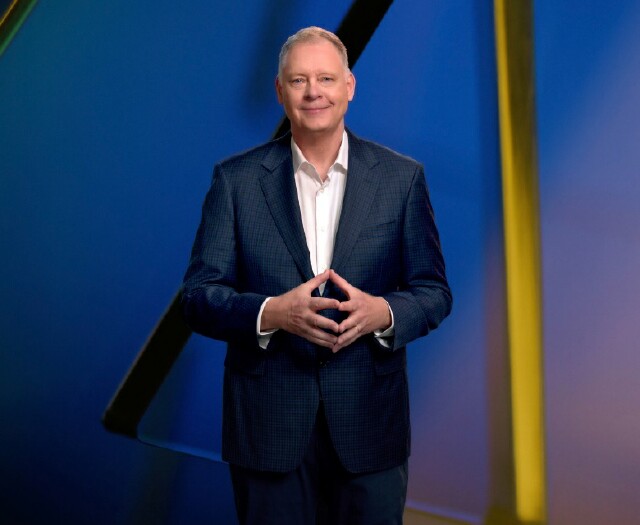A+E Networks Showed Us Why Virtual Upfront Presentations Should Remain the New Normal

It looks like A+E Networks is in for a good year ahead, with high-profile projects from Barack Obama, Kevin Costner, Reese Witherspoon, Tom Hanks, Robin Roberts, Janet Jackson and many others. I know this not because I attended a lavish event yesterday in a rainy New York City, but because I sat through a dynamic 30-minute virtual presentation in the comfort of my own home office.
Planning ahead? Bookmark Maryann Teller's essential MediaVillage Upfront calendar now!
Okay, watching a two-minute clip of our 44th president on my computer screen introducing his latest media project (an eight-part podcast about the Reconstruction Era) doesn't have the same impact as seeing him take the stage live and in-person, but the end result remains the same. He effectively launched an important program that will now be on the radar of advertisers and the press.
I might say the same about Hanks, who will be the executive producer, host and narrator of World War II, a definitive 20-hour documentary about the war that "touched every individual on the planet," as he explained. Or Jackson, who will be executive producer of Janet Jackson: Family First, a four-hour documentary that will tell us even more about the Jackson family than we already know.
The point of this column isn't to run through all of A+E Networks' announced plans for A&E, Lifetime, HISTORY and Home.Made.Nation. You can follow Simon Applebaum's annual Upfront reporting to learn more about all of them, and what A+E Networks Ad Sales President Peter Olsen had to say. (He is pictured at top.) But I will note here that the all-purpose presentation also included previews of A+E's many productions for other entities beyond its own platforms, including AMC, Hulu, PBS and Prime Video.
The COVID-19 pandemic and last year's industry strikes resulted in many Virtual Upfront presentations during the last four years. I can't speak for everyone, but I got used to them as a new vehicle for content companies to get their messages across. Conceived correctly, they can put forth a wealth of valuable information and efficiently clarify and organize the tangle of headlines and social media messages surrounding an organization's programming plans. I was amazed at how much information A+E packed into a half-hour show. Of course, A+E did the same thing last year. (Watching this year's presentation, I was also reminded of last year's virtual presentation by Netflix, which was longer but similarly effective.)
Given where we are, and who we are, and what we are thanks to technology, isn't this all the industry really needs?
Look, I value opportunities to chat with executives and talent in-person as much as anyone else. Doing so throughout my career has allowed me to establish many lasting relationships and generate a ton of editorial content, too. But after the last few years I'm just not sure that traditional Upfront events are still the best way to do that -- not with so many platforms utilizing so much content to compete for ad dollars, media support, etc. After all, their primary purpose should be to promote product and familiarize attendees with details. These days -- and likely for the rest of time -- a company need not put together a theatrical extravaganza to do so, at least not in this universe. In the metaverse or some other yet-to-be-conceived-verse, maybe.
To put it plainly, the "Upfronts," as these events have collectively come to be called, aren't the giant pop-cultural events that they were in the '90s and the early 2000s. There is simply no need for companies to crowd into "Upfront Week" and get lost in the madness of it all. (As far as in-person events are concerned, I prefer the IAB NewFronts, where several companies put on brief presentations during a given day in one location. But that is another column for another time.)
Perhaps virtual Upfront kick-offs could be followed by a series of smaller events, from those ever-popular agency meetings to cocktail parties of various size. I remember a time when the networks of NBCUniversal had their own individual Upfront events, most of them quite amazing. Bravo in 2011 outdid itself with this one, which took place simultaneously in New York City, Los Angeles and Chicago on the night of the Top Chef All Stars season finale and included dinner supervised by the finalists. It was followed by a live telecast of Watch What Happens Live! direct from the NYC party. That was much better than smooshing the best of Bravo into a slot during a mammoth corporate showcase, which is what most Upfront events have now become, anyway. (If you click through to the 2011 column be sure to read the last paragraph, which includes details of memorable Upfront events by Syfy, a pre-Freeform ABC Family and others. Those were the days.)
Creative events are still the best way to facilitate relationships and generate interest, especially in the business of entertainment. But like everything else in life these days, there are new -- or should I say, additional -- ways of doing things.
Posted at MediaVillage through the Thought Leadership self-publishing platform.
Click the social buttons above or below to share this content with your friends and colleagues.
The opinions and points of view expressed in this content are exclusively the views of the author and/or subject(s) and do not necessarily represent the views of MediaVillage.org/MyersBizNet, Inc. management or associated writers.


